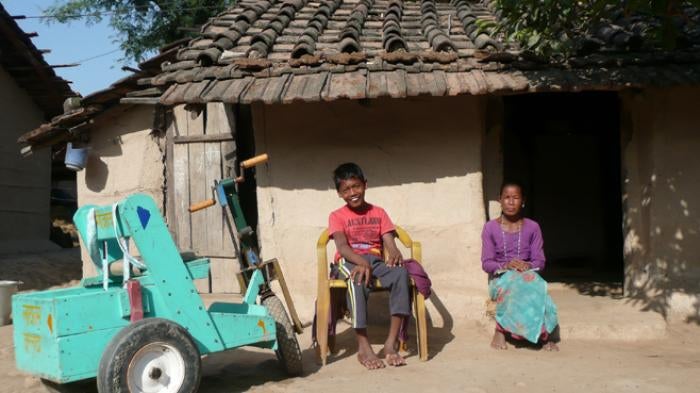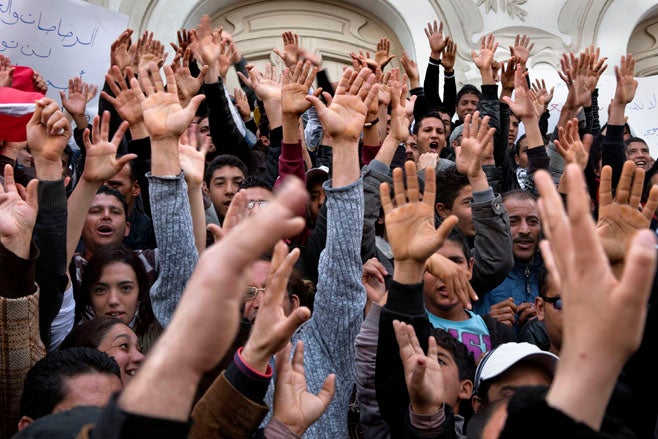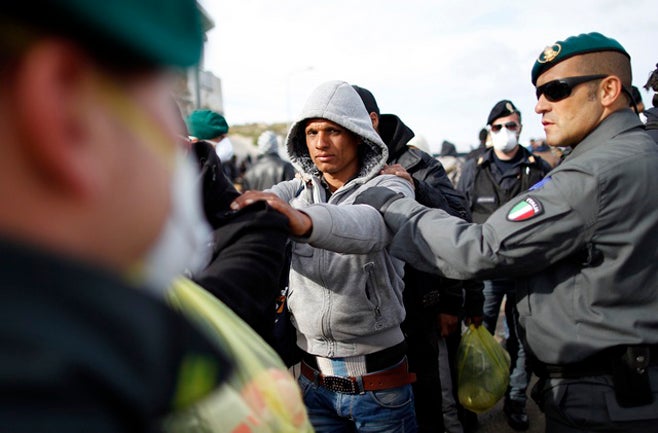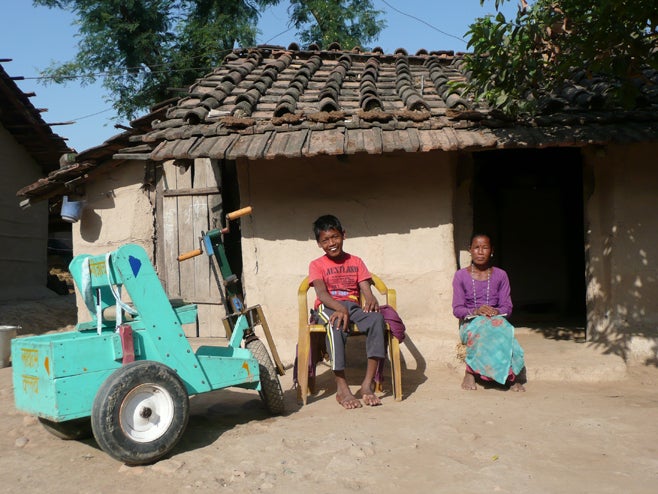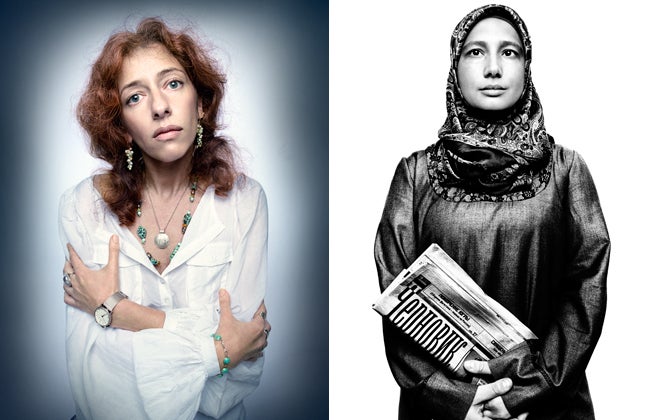Good intentions do not always make for good policy.
That is particularly true for people with disabilities, who are often stripped of the most fundamental of human rights—the right to make choices about their own lives—under the guise of “protecting” them from the challenges of decision-making and living independently. “It happens to all persons with disabilities,” Jennifer, a woman with a physical disability in northern Uganda, told Human Rights Watch. “It is as if we weren’t human.”[1]
In Croatia, for example, Human Rights Watch found that more than 70 percent of persons with intellectual or mental disabilities living in nine institutions that we visited were there without their consent or the opportunity to challenge the decision to keep them there. Living out grim and regimented days, they cannot even take a shower in private and are deprived of the ability to make even basic decisions, including what to eat and what time to sleep. Many residents have been there for most of their lives. As one young woman, Marija, told us, “Once you enter, you never leave.”
Meanwhile in Peru the government excluded more than 23,000 people with intellectual and mental disabilities from the voter registry before the April 2011 national election. The decision was based on assumptions that people with such disabilities cannot make decisions on their own, and that the government was “protecting” individuals with disabilities from being penalized for not voting.[2]Pressured by local disability rights advocates and the Ombudsman’s Office, the government invited people with disabilities to register. But with limited time and poor communication regarding the about-turn in policy, fewer than 60 people with disabilities were added back to the roster before the election.
As these examples show, restrictions on legal capacity are based on law, policy, accepted state practices, or arbitrary decision-making by state officials. Government laws and policies restricting or removing legal capacity of persons with disabilities reflect an understanding of disability as a medical issue. As Human Rights Watch’s country-specific research has shown over the last two years, deprivation of legal capacity profoundly impacts people with disabilities, for example, when it comes to the right to health, political participation, access to justice, and freedom from arbitrary detention. Indeed in many countries, national laws recognize persons with disabilities as unequal citizens, sometimes allowing them fewer rights than children.
The Convention on the Rights of Persons with Disabilities (CRPD)—the most recent comprehensive human rights treaty—reaffirms that persons with disabilities have rights, and challenges the inequality and discrimination inherent in laws that infantilize individuals with disabilities.[3]Disability is described as long-term physical, mental, intellectual, or sensory impairments that—because of physical, communication, and attitudinal barriers—limit inclusion and full participation in society.[4]Respect for inherent dignity, independence, individual autonomy including the freedom to make one’s own choices, and non-discrimination are among the CRPD’s core principles.[5]
The convention compels us to start with the premise that people with disabilities have the same rights and equal recognition under the law as all others. The CRPD also acknowledges that persons with disabilities may, in certain situations, need support exercising their rights.
However, the convention does not spell out how the right to legal capacity and supported decision-making should be implemented. As a result, disability advocates, legal experts, and governments find themselves trying to interpret the scope of these provisions, while providing rights-affirming alternatives to old patterns of guardianship and substituted decision-making.
Disabled peoples’ organizations (DPOs) and persons with disabilities, who were key actors in advocating for and drafting the treaty, must be engaged and take the lead in this process. Indeed, the CRPD itself requires that states involve DPOs and experts with disabilities in implementing and monitoring the treaty.
The Impact of Legal Capacity Restrictions
Losing one’s legal capacity can be devastating. For example, Milica, a woman with an intellectual disability in Croatia, was stripped of her legal capacity by a court decision and forced to live in an institution for approximately 20 years.[6]She even had to ask her sister for permission before marrying her husband.[7]
In Peru, Roberto, a 37-year-old man with a mild intellectual disability, went to a regular school and now has a job, yet was denied the chance to open a bank account because of an arbitrary decision of bank officials. His national identity card is labeled “mentally disabled” on the back. His father told us, “The bank staff looked at him strangely. He understood. He felt bad, I felt bad.… Roberto doesn’t need to wear a sign on his chest [that he has a disability] .”[8]
In the United States, some immigrants with mental disabilities are unjustifiably detained for years on end, sometimes with no legal limits.[9]Why? Because they do not get the support they need, such as legal representation, to make claims against their deportation.
Despite the protections outlined in the CRPD, most countries still maintain a system of guardianship for those deprived of legal capacity. Guardians are usually appointed by a court and make decisions on behalf of the individual. With such power comes plenty of opportunity for abuse, emotionally, financially, sometimes even physically. What we once considered well-intended protection for persons with disabilities often resulted in abuses in access to justice.
To combat these abuses inherent in the guardianship system, governments must adapt their laws to ensure that an individual’s rights, will, and preferences are respected. So far no government has completed the complex transition from substituted decision-making to a system of autonomous decision-making with adequate support mechanisms, as the CRPD requires. Some countries have set out on the right track, and others should benefit from these experiences.
Living in the Community
Persons with disabilities are at particular risk of arbitrary deprivation of liberty. This is because their compulsory placement and confinement in an institution may not be considered as“detention” under domestic law, especially when—as in a number of countries—it is done under the decision of a guardian.
“There, I was free,” Marija, a young woman with mild intellectual and mental disabilities told Human Rights Watch about her experience living in a home in the community.[10]She now lives in an institution.
The CRPD recognizes the right to live in the community on an equal basis as others, including the choice of residence and development of a supportive and independent living arrangement.[11]There are a number of examples of how it can be done: Senada, who lived in an institution in Croatia for more than seven years, has lived in the community since 2006. Although she initially needed support from staff in her community living program, she now lives alone, has her own key, buys her own food, and cooks. She has a job and decides how she spends the money she earns.[12][ In other words, she lives just like others.
Even long-term residents of institutions have shown they can successfully transition into community life. For example, Milica and her husband, whom she met in the institution, are able to cook, go to the market together, and take care of their daily living needs.[13]But because Milica has difficulty with numbers, she receives assistance with financial matters such as paying her bills and buying groceries.[14]Based on interviews with former residents of Croatian institutions, it is clear they took particular pride in their ability to live in the community, even if they did need support to make that possible. For them, independent living has led to a better, more productive life and given them a purpose and reason to live.
Political Participation
Disenfranchisement of people with disabilities, as seen in Peru, is not uncommon. However, Peru is also an example of where local disability groups and the Ombudsman’s Office used the CRPD to advocate for change. In October 2011 the government reversed its policy and pledged to take prompt action to reinstate voting rights to the more than 20,000 persons with disabilities who were unable to vote in the presidential elections.[15]However, the victory was not complete as Peru’s civil code still limits the rights of some people with disabilities to participate in the political process.
The practice of excluding those perceived as lacking the capacity to vote has a long history, and currently most democratic countries have capacity-related qualifications for voting.[16]In Germany, for example, the electoral law prevents some citizens from voting based on disability, including if someone is “not eligible to vote owing to a judicial decision, … a custodian has been appointed … and he or she is accommodated in a psychiatric hospital...”[17]The constitutions of Thailand, Kenya, India, and Ghana limit the right to vote for people with “unsound mind.” In Hungary the new constitution adopted in June 2011 states that no one should be discriminated against based on disability, but also permits a judge to remove the right to vote from those with "limited mental ability." Similarly, the Council of Europe's advisory body on constitutional matters, known as the Venice Commission, has been considering amendments to protect the right to political participation of persons with disabilities, yet to date has deemed acceptable laws and practices that enable judges to restrict their right to vote.
The CRPD, however, requires governments to "ensure that persons with disabilities can effectively and fully participate in political and public life on an equal basis with others, directly or through freely chosen representatives, including the right and opportunity for persons with disabilities to vote and be elected.”[18]The convention allows for no exceptions. The CRPD's treaty body has recently said that disability-based discrimination should be prohibited in all laws, "particularly those governing elections" and that "urgent adoption of legislative measures to ensure that the right of persons with disabilities, including persons who are currently under guardianship or trusteeship, can exercise their right to vote and to participate in public life on an equal basis with others."[19]
There is not, and cannot be, a clear and objective measure of knowledge related to participating in an electoral process. Already in any election, people vote for a range of reasons, including preference for a candidate’s agenda or their image. Some publicly state their intention to vote for candidates randomly or to write in fictional candidates. En masse exclusion of persons categorized as “disabled” clearly violates the right of political participation. Especially when read together with its provisions on non-discrimination and legal capacity, the CRPD makes clear that there should be no case-by-case restrictions on this right on the grounds of disability. Governments can and should do much more to honor the right of citizens with disabilities to participate in the political process and provide them the necessary support to exercise this basic right.
Informed Consent
Free and informed consent is one of the pillars of the right to health and to legal capacity. For people with disabilities, this principle is often violated and undermined by paternalistic attitudes and actions. For example, Human Rights Watch found that women and girls with disabilities in Argentina are infantilized in the reproductive health system, and stripped of their capacity to make decisions about available services. One woman told Human Rights Watch that some doctors thought her incapable of remembering to take her daily contraceptive pill because she is blind.
The coerced sterilization of women and girls with disabilities is another issue of serious concern. In Nepal, women and girls with intellectual disabilities were sterilized without their free and informed consent. In these cases, the decision to perform the sterilization was made by the parents in consultation with a doctor.[20]Dr. Lalitha Joshi, mother of a young man with Down’s Syndrome in Nepal, told Human Rights Watch: “If parents and society really care for children with disabilities, there’s no need to sterilize them. We can train them to look after themselves.”[21]
It is particularly common in institutions and other closed settings to deny people with mental or intellectual disabilities the right to consent to decisions that impact their lives. In visits to two psychiatric institutions in Peru, for example, staff told Human Rights Watch that if residents refuse to take their medications, they simply disguise the medications in meals or inject them with the drugs.[22]In some cases, as noted by the United Nations special rapporteur on torture and other cruel, inhuman or degrading treatment or punishment, forced medical treatment can amount to torture and ill-treatment without the person’s free and informed consent.[23]
The Way Forward
Legal capacity is a most fundamental right: it is what makes a human being a subject in the legal system, rather than a mere object of the law. It is no coincidence that the CRPD calls on governments and communities not only to guarantee the rights of people with disabilities, but also to guarantee their human dignity.
In transitioning to community-based services and independent living programs, all relevant stakeholders—including governments, development agencies, society, and legal and health professionals—should share the experiences, models, and lessons they have learned. The continued leadership of individuals with disabilities is critical to this effort, as is the activism of local, regional, and international advocacy organizations. After all, the call to protect the rights and dignity of people with disabilities is never more powerful than when it comes from the very people who experience these injustices themselves.
[1]Human Rights Watch, “As if We Weren’t Human”: Discrimination and Violence against Women with Disabilities in Northern Uganda, August 2010, p.8, http://www.hrw.org/reports/2010/08/24/if-we-weren-t-human
[2]Human Rights Watch interview with Malena Pineda Angeles, chief, Program for the Defense and Promotion of the Rights of Persons with Disabilities, July 26, 2011, Lima, Peru. Jorge Yrivarren Lazo, "DERECHOS PARA TODOS, Los derechos de las personas con discapacidad," El Comercio, October 18, 2011 http://elcomercio.pe/impresa/notas/derechos-personas-discapacidad/20111018/1319463
[3]Convention on the Rights of Persons with Disabilities (CRPD), adopted December 13, 2006, G.A. Res. 61/106, Annex I, U.N. GAOR, 61st Sess., Supp. (No. 49) at 65, U.N. Doc. A/61/49 (2006), entered into force May 3, 2008.
[4]Ibid, art.2.
[5]Ibid, art.3.
[6]Human Rights Watch “Once You Enter, You Never Leave”: Deinstitutionalization of Persons with Intellectual or Mental Disabilities in Croatia, ISBN:1-56432-686-1,September23,2010,http://www.hrw.org/reports/2010/09/23/once-you-enter-you-never-leave-0
[7]Ibid.
[8]Human Rights Watch interview with Marcelino Velazco, father of three young men with intellectual disabilities,Lima, Peru, October 22, 2011.
[9]Human Rights Watch, Deportation by Default: Mental Disability, Unfair Hearings, and Indefinite Detention in the US Immigration System, ISBN: 1-56432-665-9, July25, 2010, http://www.hrw.org/reports/2010/07/26/deportation-default-0
[10]Human Rights Watch, “Once You Enter, You Never Leave,”p.1.
[11]CRPD, art.19.
[12]Human Rights Watch, “Once You Enter, You Never Leave,”p.49.
[13]Ibid.
[14]Ibid.
[15]RENIEC (RegistroNacionaldeIdentificaciónyEstadoCivil), Resolución JefaturalNº 508-2011-JNAC/RENIEC )October 10, 2011), http://www.reniec.gob.pe/portal/TransparenciaAdm?id=005&anno=&valorInicial=16&valorMenu=13(accessed November 16, 2011).
[16]Marta Mendiondo, Pamela Teaster and Susan Lawrence, “Public Guardianship: In the Best Interests of Incapacitated People?,” August 10, 2011, ISBN: 0313378274.
[17]Federal Electoral Law (Bundewahlgesetz, BGW), s. 1. art. 13.
[18]CRPD, art. 29a.
[19]Concluding observations of the UN Committee on the Rights of Persons with Disabilities regarding Tunisia; Fifth session, April 11-15, 2011, paras. 13 and 35.
[20]Human Rights Watch, Futures Stolen: Barriers to Education for Children with Disabilities in Nepal, August 2011, http://www.hrw.org/reports/2011/08/24/futures-stolen.
[21]Human Rights Watch interview with Dr. Lalitha Joshi, gynecologist and president of the Down’s Syndrome Association, Kathmandu, Nepal, March 30, 2011.
[22]Human Rights Watch interview with staff members at Hospital Hermilio Valdizan, Lima, Peru, October 25, 2011. Human Rights Watch interview with a nurse at Hospital Victor Larco Herrera, Lima, Peru, October 26, 2011.
[23]Report of the special rapporteur on torture and other cruel, inhuman and degrading treatment, Manfred Nowak. A/63/175, July 28, 2008.
